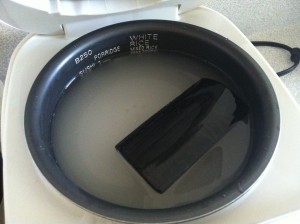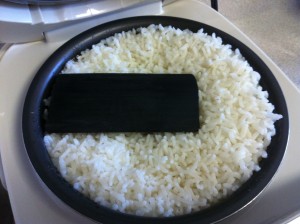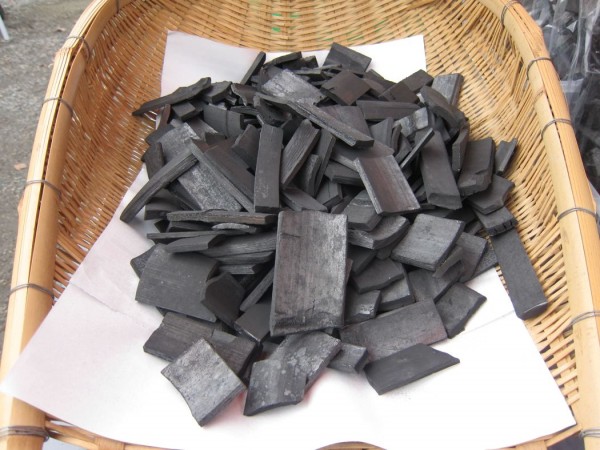Last month, on a 16-day trip to Japan, I happened to be in Kyoto on the 21st, the day every month a huge — and hugely popular — flea market is held on the grounds of Tō-ji (temple).
While browsing the booths hawking everything from freshly made okonomiyaki to used Nikon cameras, I came across one selling flat pieces of charcoal.
And I had no idea why.
So I walked over and, in my very elementary Japanese, asked the smiling woman in the booth what these charcoal blocks were for.
Thankfully, she could speak English. And even better, she had brochures for American tourists just like me.
She explained that these were pieces of bamboo charcoal, taken from older plants and burned inside an oven at extremely high temperatures. The result is an environmentally functional material that has excellent absorption properties — and lots of other uses I had never heard of before.
For example, you can place it in water to purify it. You can put it in your refrigerator to remove odors and keep your fruits and vegetables fresh. You can place it in hot oil to improve the taste and crispness of whatever you’re frying. It can even clean and ionize the atmosphere in your room and protect your electronics.
But one of the more common uses of bamboo charcoal is for cooking rice. It absorbs chlorine, bad odor and toxic substances from water, thusly improving the taste, look and quality of the rice.
That sold me.
So I bought a bag of bamboo charcoal, shared some with my parents, and saved one to try myself.
 I debated between using this block of bamboo charcoal to purify my drinking water — another popular use, one that dates back centuries — or in my rice cooker. The latter was more of a draw for me since I eat way more rice than I drink water. So I tried it last night.
I debated between using this block of bamboo charcoal to purify my drinking water — another popular use, one that dates back centuries — or in my rice cooker. The latter was more of a draw for me since I eat way more rice than I drink water. So I tried it last night.
I placed the block in my rice cooker, right in the water, before I cooked it. I wasn’t sure what it was going to do or how the rice would be improved by it. I had my doubts.
 Well, I gotta say, I’m pretty sold on this.
Well, I gotta say, I’m pretty sold on this.
Not only was the rice shinier — I thought, for a minute, the rice might turn black due to the charcoal, but it didn’t — it actually tasted better. Derek put it best: “It’s like the difference between drinking tap water and mineral water.”
It actually tasted cleaner, like I had rinsed the rice in Evian.
I’m sold.
Anyone else tried using bamboo charcoal? (If not, you should!)





22 Comments
Hello Cat,
I’ll be in Kyoto in a few weeks. I hope I can find the bamboo charcoals.
So excited! When are you leaving? Going to Fukuoka??
We are leaving on 6/6 to Fukuoka for a few days then to Osaka for a couple days, then to Kyoto for a few days and on to Tokyo till the 21st. Any tips besides what you posted?
Same function w/ charcoal and aquarium filters.
Can you use the block again, or is it one and done? Gotta try it!
I’m pretty sure you can use it again. I am!
What do you think is in Britta filter? Charcoal….
Really? I had no idea!
charcoal is also good as an air purifyer, gets rid of odors
That’s what I found out, too. Of course, folks have known this for centuries and I’m just finding out now!
This is one of those simple discoveries that’s probably been used for hundreds or thousands of years. I never heard of it before, but now I know. Seems safe and easy to transport, and in its charcoal form, totally clean and pest free. Hmmm, I’ve gotta give it a try.
Yeah, I’m a convert! I’ll find out where you can get these locally.
Anyone know if this is available in the US? I wanna try this!
I’ll look around, too.
We have a 200 ft well and so no chlorine to deal with. Been drinking it unfiltered for years now and can say it tastes so much better than any city water I’ve ever had. It also does not change the flavor of whatever we are cooking. As for bamboo charcoal… how well does it work if you try to toss it in a barbecue smoker or something like that? We use hickory for that around here and it tastes pretty good.
If it removes odors I’d keep a block in the house for the dog… assuming she didn’t eat the thing.
I heard rice tastes better if the water quality is better, which makes sense. Notice a difference with the well water?
Yes. Much better rice with well water. Homemade beer was also much better. It is a good idea to have your well water tested periodically. But I can truly say that it is water that tastes great right from the faucet. Even though water does not supposedly have a flavor.
CAT,
this sounds like a guud idea. I noticed that rice cooked in cookers with non-stick lining have a peculiar odor. I notice it but others may not. I think it is the chemicals in the coating that leeches out. Need to find the charcoal to check it out.
very interesting. another example of modern science just reinventing the wheel (science nerd moment: charcoal, being carbon, binds to many impurities in water/air and draws them out. many of the impurities are organic (carbon based molecules) so they have an affinity for carbon)
my mom and dad have a stand of bamboo in their back yard. I wonder if we can make this at home.
Interesting…
I like try, So where did you get your stash?
[…] with charcoal is more than just firing up the grill. Slip in a piece of charcoal when you’re boiling rice or pasta it naturally absorbs chlorine, bad odor and toxic substances from […]
Howzit?
Arsenic is a good reason to use it if you eat lots of rice. Arsenic in the rice not the water. Especially for children who may consune rice everyday like in Hawaii, that’s important. Just do a search of – Arsenic in Rice.
From what little I know making activated charcoal isn’t a DIY project as it requires very high heat. It is available online. However, charcoal for water is different than charcoal for air filtration I believe.
Naturally you reuse a chuck of activated charcoal like in your images, until it captures too many impurities.
You probably know all this by now and more.
Mahalos,
Tino